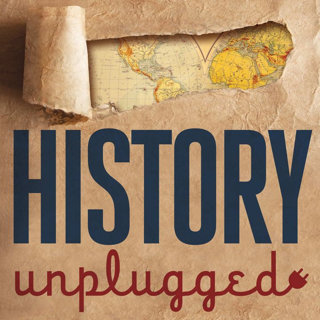
History of the Civil War in 10 Battles, Part 5: The 1862 Peninsula Campaign
In early 1862 the Union Army launched a major operation in southeastern Virginia, the first large-scale offensive in the Eastern Theater. Lincoln replaced McDowell with George B. McClellan as commander. He reorganized the army, whipped it into shape, and also renamed it the Army of the Potomac. The goal was to roll over the Confederacy. The Rebels were not about to let that happen.See omnystudio.com/listener for privacy information.
2 Okt 201858min

History of Civil War in 10 Battles, Part 4: The Battle of Shiloh
The Battle of Shiloh was a battle in the Western Theater fought April 6–7, 1862, in southwestern Tennessee. On the first morning, 40,000 Confederate troops struck Union Soldiers at Pittsburg Landing. They were under the command of Major General Ulysses S. Grant. The Confederate Army of Mississippi, under the command of General Albert Sidney Johnston, launched a surprise attack on Grant's army from its base in Corinth, Mississippi. Johnston was mortally wounded during the fighting; Beauregard took command of the army and decided against pressing the attack late in the evening. Overnight, Grant was reinforced by one of his divisions stationed further north and was joined by three divisions. The Union forces began an counterattack the next morning which reversed the Confederate gains of the previous day.See omnystudio.com/listener for privacy information.
27 Sep 201845min

History of the Civil War in 10 Battles, Part 3: Border States and the War in the West
In the summer of 1861, four slave states had still not seceded. If even two or three joined the Confederacy, the Union would be in big trouble. Lincoln was determined to keep all four in (Maryland, Kentucky, Delaware, and Missouri). We will look at these developments, along with the The War in the West, April 1861 - April 1862, where many famous Civil War figures emerge, such as Ulysses S. Grant.See omnystudio.com/listener for privacy information.
25 Sep 201842min

History of the Civil War in 10 Battles, Part 2: First Battle of Bull Run
Abraham Lincoln believed that the Civil War would be over in a few months, with the Union Army marching on Richmond by late 1861. Both sides hastily assembled armies and Brig. Gen. Irvin McDowell led his unseasoned Union Army across Bull Run against the equally inexperienced Confederate Army of Brig. Gen. P. G. T. Beauregard. The Confederates won a surprise victory, particularly due to the efforts of Stonewall Jackson, and routed the Union. Both sides dug in their heels for a long war ahead.See omnystudio.com/listener for privacy information.
20 Sep 201857min

History of the Civil War in 10 Battles, Part 1: Background to the Civil War
The origins of the Civil War go back decades, even before the United States became an independent nation The federal union had always been precarious, ever since the framing of the Constitution, with the institution of slavery led to two distinct cultures and societies. In this inagurual episode of the History of Civil War in 10 Battles, Scott and James discuss the main social and political issues that sparked the Civil WarSee omnystudio.com/listener for privacy information.
18 Sep 201846min

Special Announcement: A History of the Civil War in 10 Battles Begins Next Week
The Civil War pitted brother against brother and divided a nation. It also featured the most epic—and deadliest—battles in American history. From Shiloh to Vicksburg to Gettsburg, these battles resulted in higher casualty rates than any other armed conflict the United States has ever faced.But beyond that the Civil War did more to define and change the United States than any other event. It determine what kind of nation the United State would be.Next week we will begin a massive multi-part series on the ten most important battles of the Civil War. We are joined once again by history professor James Early to get into the military history of the Civil War, whose effects are still being felt in the United States and the rest of the world today.See omnystudio.com/listener for privacy information.
14 Sep 20184min

How a 1522 Battled Transformed Russia from a Minor Duchy into Earth's Largest Empire
The Russian Siege of Kazan in 1552 and the conquest of Kazan and Astrakhan by Muscovy can be seen as the birth of a Russian Empire. It had profound consequences for the steppe region and beyond, allowing Russian expansion eastwards, eventually as far as the Pacific. Today's guest is Carl Rylett, host of A History of Europe—Key Battles Podcast. He has put together a battle history podcast that shows how so much of the history of Europe was shaped by military forces.See omnystudio.com/listener for privacy information.
13 Sep 201830min

The Most Famous Founding Father You’ve Never Heard of Was Hamilton's Arch-Nemesis and a Deficit Hawk
Alexander Hamilton had a nemesis… and it was not Aaron Burr. After Hamilton enacted a wide-scale spending program to build up America's military and infrastructure, and thus send it into debt, newly-elected President Thomas Jefferson chose a Secretary of the Treasury to dismantle his system—Albert Gallatin.Considered a “foreigner, a tax rebel, and a dangerously clever man,” the Geneva-born Gallatin was despised by Hamilton and the Federalists. During their political careers, these two economic masterminds were locked in a battle to surmount the other’s financial system for the new nation.During his twelve years as Secretary of the Treasury, Gallatin overcame his predecessor by-- Repaying half of the national debt-- Containing the federal government by restraining its fiscal power-- Abolishing internal taxes in peacetime-- Slashing spendingToday I'm talking with Gregory May, author of the new book Jefferson’s Treasure: How Albert Gallatin Saved the New Nation from Debt. We discuss Gallatin’s rise to power, his tumultuous years at the Treasury, and his enduring influence on American fiscal policy.See omnystudio.com/listener for privacy information.
11 Sep 201837min






















